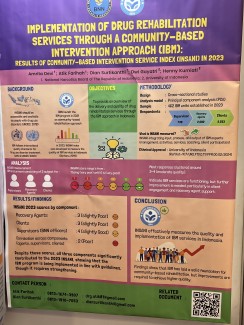Implementation of Drug Rehabilitation Services Through a Community-Based Intervention Approach (IBM): Results of Community-Based Intervention Service Index (INSANI) in 2023

Background:
Independent and community-based services should be available and easily accessible to drug users (UNODC, 2018). Therefore, the Deputy for Rehabilitation of BNN initiated the IBM Program in 2021. Although IBM services are provided in a simple form with a low threshold, they still refer to the quality standards of drug use disorder services (WHO & UNODC, 2020). Therefore, since 2023 a INSANI has been developed to measure the quality of IBM services in Indonesia (Berhanu, 2019).
Objectives:
To obtain an overview of IBM drug rehabilitation service delivery.
Methods:
This research used a cross-sectional study design and Principal Component Analysis model. IBM respondents were BNN officers, recovery agents (AP), and clients. INSANI measures IBM services that integrate inputs, processes and outputs of governance, activities, services, coaching and client engagement (Berhanu, 2019). This study has passed ethical review from the University of Indonesia (Nomor: Ket- 107/UN2.F10.D11/PPM.00.02/2024).
Results:
INSANI measurement was conducted in 462 IBM units with a respondent of 2,082 AP as IBM implementers activities and services, 739 BNN officers as coaches, and 2,253 clients as program beneficiaries (clients). INSANI has a score range of 1 (very poor) to 6 (very good). The results of the INSANI measurement ranged from category 2 to 4. Dominant factors from AP's respondent in the formation of INSANI are recording and reporting, activities, screening; initial admission, intervention services, and monitoring. Whereas the dominant factors from BNN Officers are evaluate client development, post-rehabilitation assessment and recovery assistance. On the other hands, the dominant factors form clients are providing recovery support to clients, involvement in supportive services and relationships. The correlation between AP, BNN Officers and Clients are client development evaluation, post-rehabilitation assessment, recovery support and implementation of assistance. The result of INSANI value are AP in category 3, BNN Officers in category 4, Clients in category 3 and the correlation between them is in category 2.
Conclusion:
INSANI can measure and provide an overview of the implementation of IBM services in Indonesia.
Keywords: quality, community-based intervention, index